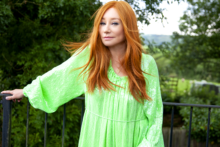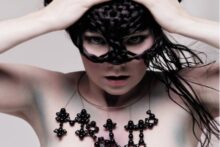Owen Myers: You’re often cited as an influence by contemporary artists, from Björk to Solange, and hip-hop artists like Big Boi from Outkast. What do you hope that other artists are able to take away from your work?
– Interview with Kate Bush in The Fader, 2016
Kate Bush: I’m just so delighted if they like my work. And the more diverse [they are], the more exciting it is for me.
It has been more than thirty-eight years since the release of Hounds Of Love. It’s a pop-historical monument; visionary, complex yet still accessible, a high watermark in Kate Bush’s career, an ethereal masterpiece by all critical consensus. And yet this middle-aged record still vibrates with freshness in the continually evolving zeitgeist.
Perhaps that feeling has been buoyed by the late success of ‘Running Up That Hill’ in 2022 and the subsequent discovery of Bush’s music by younger generations. But it’s also true that the reason Hounds Of Love remains so vital in the present is because artists from every successive musical generation since it came out have carried its influence and embedded its legacy into the cultural fabric.
Its impact on self-producing singer-songwriters, particularly non-male ones, has been seismic. The stunning triumph of Hounds Of Love cleared a path for future would be innovators who now had less to fear from being labelled ‘eccentric’ or ‘hysterical’ by the misogynistic music press.
Bush’s stubbornness in advocating for herself, her vision and her preferred ways of working kicked the doors open for artists coming after her to exist and create on their own terms. Her imagistic songwriting and immersive productions stretched the boundaries of what pop music could be.
Writer Dorian Lynskey put it this way: “Some artists open the door to a new room in the house of music; Bush is one of a handful whose imagination revealed the existence of a whole new wing.”
When Tori Amos released her debut solo album Little Earthquakes in 1992, critics were quick to point out the similarities in her sound to that of Bush. Some of the comparisons made were lazy, as if pointing out the fact that both artists were mezzo-soprano singer-songwriters who also played piano was proof of a theft. Tom Doyle asked Amos about these comparisons in a 1998 Q interview, saying, “So you were never influenced by [Bush] directly?” to which she responded, “Well . . . I must tell you that when I heard her, I was blown away by her. There’s no question.”
Listening to Little Earthquakes, which Amos co-produced, there is an undeniable Hounds Of Love quality to the big, gated percussion on ‘Precious Things’ and ‘Crucify’, with the latter song’s melismatic ‘Cha-ee-a-ee-a-ee-a-ee-ains’ recalling something of the ‘Yeah-ee-yeah-ee-yeah-eeee, yooo’ from ‘Cloudbusting’.
That song’s baroque-synthetic string arrangement feels echoed on Amos’s ‘Girl’, and there is a ‘Hello Earth’ feeling to the chilly vocal production and orchestral sweep of ‘China’.
In Q, Doyle pointed out that Little Earthquakes would, in turn, be hugely influential (“the kook rock torch passed from Bush to Amos”) in inspiring Alanis Morissette’s 1995 breakthrough Jagged Little Pill. In another 1998 interview, with German outlet Musikexpress, Amos explained how listening to The Ninth Wave had inspired her to be brave in her life, saying “[The Ninth Wave] turned me inside out. It changed my life . . . I left the man I was living with because of this record.”
In addition to regularly including Bush covers in her sets (‘Running Up That Hill’, ‘And Dream of Sheep’), in 2014 Amos appeared alongside a cavalcade of celebrity talking heads (including Elton John, Dave Gilmour, Neil Gaiman, Nigel Kennedy, Stephen Fry, John Lydon, St. Vincent, Tricky, BigBoi and more) praising Bush’s legacy in the BBC documentary The Kate Bush Story: Running Up That Hill.
But to trace the influential waves of Hounds Of Love, one must look beyond Amos and her fellow Bush-loving successors (Fiona Apple, Regina Spektor, Cat Power, Natasha Khan aka Bat for Lashes, Florence + The Machine, Annie Clark aka St. Vincent, Taylor Swift) to the ground broken by self-producing, tech-adopting artists such as Björk, Imogen Heap, Karin Dreijer (The Knife, Fever Ray) and Grimes.
In a 2014 interview with the Evening Standard Heap cited Bush as being one of the reasons labels took her work seriously, saying, “Kate produced some truly outstanding music in an era dominated by men and gave us gals a licence to not just be ‘a bird who could sing and write a bit,’ which was the attitude of most execs.” For DIY artists wishing to control every aspect of their presentation, from studio construction to image curation, Bush was a vital role model.
In a 2016 interview with Grammy Pro at Lollapalooza, Grimes named her two biggest musical inspirations as Trent Reznor and Bush, “[two] people who have done what I like to think I’m doing,” She described her creative approach as a “one-man show . . . I oversee everything myself; I produce and engineer and write everything . . . I do all of the visual artwork.”
In 2019, Grimes campaigned for the recognition of ‘ethereal’ as an official genre on streaming platforms and radio playlists, saying on Twitter, “we argue that there is a long lineage of auteur artists, often producing their own music and/or directing their own music videos . . . often very ethereal, otherworldly, and futuristic in nature”.
In 2021, Spotify recognized the term as a genre and partnered with Grimes to create a seven-and-a-half-hour playlist “dedicated to experimentalism with strong elements of pop and universal beauty”. ‘Running Up That Hill’ was featured there, alongside work from artists such as FKA twigs, Caroline Polachek, Sophie, James Blake and Imogen Heap. The long line of ‘ethereal auteurs’ that Grimes advocates for and identifies with can be traced back to the pioneering work on Hounds Of Love.
Bush’s appeal in this group is not only about creative autonomy but also emotionally articulate artistry. Norwegian singer-songwriter, producer and author Jenny Hval praised Bush’s ability to bring “emotional density” to her songwriting via “her voice, production twists and magnificent melodic themes. It’s as if she is a reporter, reporting from the war zone of human experience,” in a 2022 article in The Guardian.
Fellow ‘ethereal auteur’ Julia Holter appeared on the popular podcast Classic Album Sundays alongside Outkast’s Big Boi (a superfan who inducted Bush into the Rock & Roll Hall of Fame in 2023) to discuss her admiration for Hounds Of Love, saying “[Bush’s] music holds the emotional complexity of life.”
The album’s influence extends to rock bands, too.
Brett Anderson (Suede) cited Bush (alongside Bowie) as a major influence, telling The Guardian in 2013 that Hounds Of Love was “the album that made me want to make albums,” adding “[Suede’s second album, 1994’s] Dog Man Star wouldn’t have been the same album without Hounds Of Love – it was totally inspired by it”.
Singer-songwriter and composer Rufus Wainwright was transparent in a 2005 interview with Mojo about Bush’s influence on his work, saying,
“There a real danger that you become clouded when you listen to her. So many people try to copy her – no names, except for me! I’ve copied her . . . And I intend to copy her more! . . . Her attitude towards love and society’s treatment of love is very combative and most gay people can connect with that.”
In a 2005 article in The Guardian Anohni (Anohni and the Johnsons), said how Bush was the ‘first singer’ (‘sensuous and very pagan’), who inspiredthe development of her unique vocal style.
In a 2023 interview with Björk, the two artists discussed Bush’s influence on their work, with Björk simply identifying Bush as ‘mother’.
Björk’s creative autonomy as a self-producing artist of texturally rich, concept-driven avant-pop owes much to Bush’s legacy. She has always been quick to speak about her love of Bush’s music, and the influence it has had on her creativity throughout her career, and her evolving aesthetic, inspired equally by a deep love of technology and enchantment with the natural world.
Both Björk and Bush were included in Solange Knowles’s redefinition of the term ‘classic’ which she discussed in a 2017 interview with Elle magazine. “We get to define our own terms and for me it’s just about authenticity,” she said, adding, “they’re Björk, Kate Bush, Erykah Badu. You can look at images or hear any part of their work now from 20 years ago and it’s classic because it’s authentically who they are, what they were, and what they were embodying.”
Even though I am not a famous musician, the influence of Hounds Of Love has been profound in my creative life. The album gives you permission to work the way you know how – the way you know is best. To follow your muse uncompromisingly. To give creative labour only on your own terms. It is a reminder that having a safe space, and privacy, is crucial. It also reinforces the value of working slowly – that slow work can still engage with our intuitive senses.
The length of time between Hounds Of Love and what came next only dilates – four years until The Sensual World (1989), another four to The Red Shoes (1993), a twelve-year gap to Aerial (2005), her late masterpiece, and another six years before 50 Words For Snow (2011).
The freedom to take your time is a vital ingredient, and those gaps between records, not to mention the records themselves – all self produced – would not have been possible without Hounds Of Love.
Nearly four decades on, it remains as sticky as ever in the culture, re-entering the public consciousness in consistent waves over generations: in 1992, Utah Saints sampled ‘Cloudbusting’ in their top five UK hit ‘Something Good’; in 2003, Placebo covered ‘Running Up That Hill’, with their version synced in several TV shows; in 2005, indie band The Futureheads had a top 10 hit in the UK with their cover of ‘Hounds of Love’; in 2012, a remix of ‘Running Up That Hill’, created specially for the London Olympics’ closing ceremony, peaked at number six in the UK chart. In addition to the original song re-entering the charts in the wake of Stranger Things in 2022, it was also covered by German pop star Kim Petras, who is trans, and released to coincide with Pride Month celebrations.
In a statement, Petras highlighted the song’s LGBTQ+ credentials, saying, “I have always been obsessed with “Running Up That Hill” . . . For me, it’s about equality.”
This is an edited extract from Leah Kardos’ 33/13 book on Kate Bush’s Hounds of Love (Bloomsbury Academic), published 14th November 2024. Kardos is a senior lecturer in music at Kingston University London.








